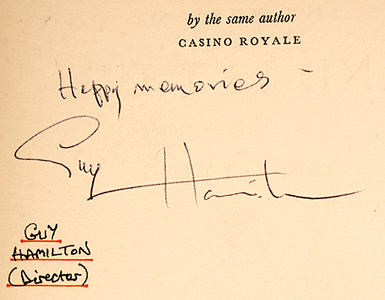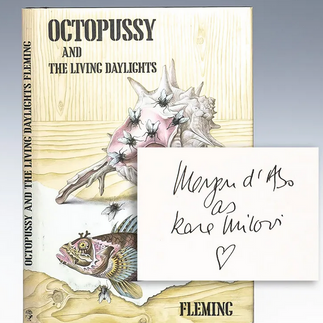Actor-signed 1st editions - desecration or just different?
- Peter Crush
- Aug 15, 2024
- 6 min read
Do actor-signed first editions spoil or enhance James Bond first editions, or are these a crossover too far for real book lovers?

At the end of last month, George Lazenby – the Australian actor best known for playing James Bond in the cult-classic, On Her Majesty’s Secret Service – shocked his legion of fans when he unceremoniously declared he would be retiring from acting to spend more time with his family. Not just soon, but with immediate effect.
Aged 84, he arguably deserves it, but the statement he made on X (formerly Twitter) – which came as a big surprise to many – will be bittersweet from some.
Because as part of his statement, he confirmed that he won’t be doing “any more interviews or signing any more autographs as of today [25th July 2024].
No notice means no more signed books

Unlike when Ringo Starr – who called time on signings, but at least gave people two-weeks’ notice – Lazenby’s immediate cessation will be a big blow to those who wanted his signature, but never suspected he would immediately cease his activities.
And specifically, his retirement also means that there will also be no more of these (see above) – Lazenby-signed copies of Ian Fleming’s ‘On Her Majesty’s Secret Service’ - copies which have cropped up on the market from time to time, and which he was more than happy to autograph.
Actor crossovers

Collecting Fleming has always – by virtue of the steady stream of Bond movies – involved an element of collector crossover.
It’s probably uncontroversial to say that it’s precisely because of the 60-year-plus movie franchise that the first edition collectable market for Ian Fleming books has remained so strong for so long.
Where other writers’ works have faded from public consciousness, Bond has continued to remain iconic – helped in some part through the various film resurrections, each bringing new audiences to Bond – some of whom develop interest in the literary side to Bond.
Even back in the day publishers knew the power of the films to create book sales – which was why the movie-tie-in (MTI) books – typically in paperback – were produced in vast numbers, primarily to attract those whose main interest was the films, rather than the literary books per-se. These are now extremely collectable in their own right - not least very rare Pan You Only Live Twice, with dust-jacket (above).
But are actor-signed books a crossover too far?
Signed books – such as the aforementioned Lazenby On Her Majesty’s Secret Service one – are the embodiment of this crossover activity in action – where film fans/collectors primarily want the signatures of the principle actors/models/directors who appeared in movies corresponding to the book of the same name.
You can see why this has appeal – autograph collectors, and movie-fans want anything associated with a film that they love - and the more interesting the object that's signed, the better.
But the question of actor-signed first editions has also long been a controversial one.
As we all know, by the end of the 1960s, the film adaptions of the Ian Fleming books became increasingly divergent from the content of the books – with the title alone often being the only commonality that the films and the books shared.
So are actor-signed Bond books merely first editions that have been defaced, or do they add any additional cache to an already scarce first edition?
It’s a question worth asking I think, because I am seeing more actor signed first editions coming on the market.

In the last few week, a first edition of Goldfinger was offered for sale by Raptis Rare books – featuring the signature of the first big-screen Bond actor, Sean Connery.
Although Goldfinger was not the first Bond movie (it was the third, after Dr No and From Russia With Love), this is the movie that many regard as being the one that set the template for how all future Bond films should be made.
As such (wait for it)…the book was up for sale for a whopping £6,000. A quick check shows it’s already been sold.
Despite the hefty price tag, the fast sale shows that there is strong demand for actor-signed Ian Fleming first editions, and others also exist.

This Eunice Gayson-signed Dr No, (left) sold earlier this year (Gayson played Sylvia Trench in the film Dr. No), while copies of The Spy Who Loved Me, signed by prolific signer, Caroline Munro (Who Appeared in the film of the same name) also do the rounds.
First edition Ian Fleming books also appear signed by Roger Moore. This double-signed first edition of Live and Let Die comes with the scrawls of both Roger Moore (his first Bond movie) and Guy Hamilton – who directed it. It’s currently up for sale for more than £5,000. (see below):


West Hull Rare Books meanwhile (above, left), has this first impression, Roger Moore-signed ‘For Your Eyes Only’ for £3,450, while another Moore-signed book (above, right) – this one of The Man With the Golden Gun, is also up for sale – for £2,352.00 (Although I'm not 100% convinced by the signature on this one).
Here's some more: A ‘The Man From The Golden Gun’ (above left), from John Atkinson – price £1,950. Others that are also on the market include a Moore-signed Octopussy (above middle), and the same title, but this time signed by Maryam d’Abo (above, right), who played Kara Milovy in the movie The Living Daylights.
Despoiled or just different?
So what are these books – despoiled or just different?
I know literary collectors who hang their heads in despair when they see actor-signed books – viewing them as abominations with little or no real connection to the literature of the book.
They tell me that books should only, in their opinion, be signed by either the author, or at a stretch, the illustrator – and contemporaneously at that, rather than be signed much later at a film convention or such like, where people queue up and pay to have their merchandise signed.
But is that being too snobbish?
The more I think about these signed books, the more I’m inclined to think that maybe we should be more generous and just accept that literary collectors are not the ‘right collectors’ for these books, but that for film aficionados (that also enjoy the Bond books), they are fantastic.
Of course, literary collectors will often claim that not only are actor-signed books inappropriate, but they devalue bona fide first edition books.

True, but not always the case.
Harry Potter books signed by the three main movie stars can change hands for more than author signed ones (see left).
However….I would maybe argue here that in this possibly because many people identify with the films first, or at least concurrently with the books – the films and books were near contemporaneous.
So are Fleming books different?
Possibly, yes.
Most of books were already written, and the films came later in Fleming’s life. For this reason actor-signed books appear more like signatures shoe-horned in rather than being the natural bedfellow of a particular title.
Literary collectors also argue that actor signed books are bad, mostly because the film that’s loosely-based on book bares no actual relevance to the book itself.
Few people could argue against this.
In the example of the Connery-signed Goldfinger, there is perhaps a case to be made for the book and the signature being in perfect alignment – iconic book, iconic actor, and iconic film all coming together.
This can certainly be said about this book in a way that I don’t see with, say, The Man With the Golden Gun, or Moonraker, or For Your Eyes Only, which all had a wildly different film treatments.
Perhaps it’s because Goldfinger (the film) and Goldfinger (the book), were largely the same that the match-up works, and as the films start to veer off-course from the books, it’s a harder task to convince someone that the actor’s signature and book belong together.
Of course, some people like the books, and they are massive followers of the films. To these people a book decorated by the stars themselves is perfect, and signatures can still be added as signings crop up.
That’s why I feel we need to take a measured view.
To those who covet actor signatures in first editions, in my heart I say we all have the right to collect what we like, and some people like movie star signatures, and will want to use the books as the vehicles for this.
But I do also have to say that if I had the choice of between buying a fine condition Dr No signed by Eunice Gayson, and a fine condition unsigned one, I would probably still go for the latter.
Personally, I don’t think the signature ‘adds’, and for my tastes, it probably detracts.
I like to keep the books and the films separate.
I enjoy the films, but my first love is for the books – as they were originally printed.













